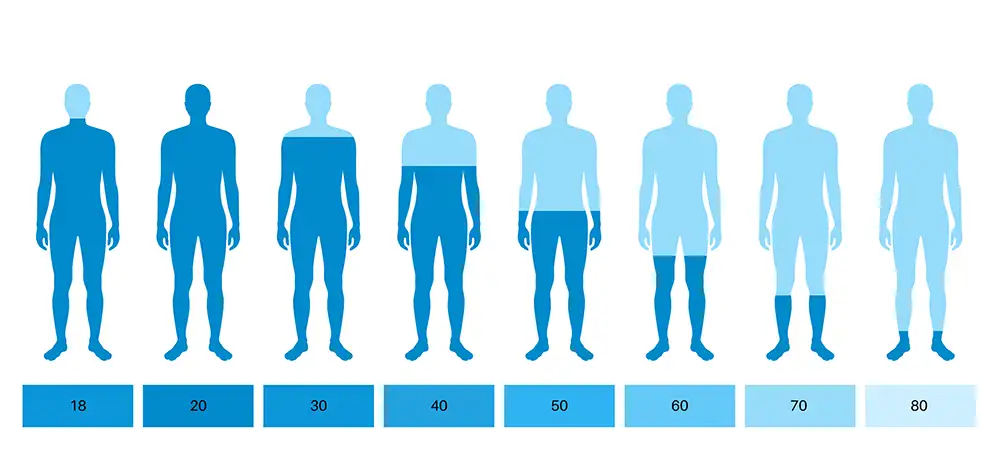Testosterone is essential to various areas of male health. Also known as the primary male sex hormone, testosterone carries out a wide range of key functions in the body, from fueling sex drive to aiding in the development of muscle mass. Maintaining regular testosterone levels can also help manage body fat distribution and the production of sperm and red blood cells.
Because testosterone plays such a pivotal role in men’s overall health and well-being, inadequate levels of this hormone can cause various physical, mental, and sexual issues to develop. It’s important to recognize the signs of a testosterone deficiency to determine whether your hormone levels are lower than usual. If you’re concerned you may have low T, there are many different solutions available to you.
One of the safest and most effective methods for raising testosterone is hormone replacement therapy. Through regular treatment sessions, you can directly target your hormone deficiency and enjoy improved well-being. Before you seek help, though, it’s vital to do what you can to boost your testosterone levels naturally. Making a few simple lifestyle adjustments can make a meaningful difference in your hormone health. Here are some guidelines to keep in mind.
Watch Your Diet
You might not realize it, but the food you eat can affect your hormone levels. Certain foods may cause your testosterone levels to drop, while others can help boost them over time. Incorporating the right foods into your diet can help you feel better both physically and mentally.
If your hormone levels are lower than normal, we recommend limiting your intake of these foods and beverages, which can further deplete testosterone in your body:
- Spearmint & peppermint
- Flaxseed
- Walnuts
- Licorice root
At the same time, be sure to incorporate these foods and beverages into your diet to gradually increase your hormone levels:
- Tuna
- Egg yolks
- Low-fat or skim milk
- Fortified cereals
- Cruciferous vegetables
- Pomegranate
- Oysters
When adjusting your diet, remember that consistency is crucial. Eating testosterone-boosting foods while avoiding hormone-depleting ones regularly can lead to positive results over time.
Make Sleep a Priority
Getting enough sleep every night allows your body to function at its best. Sleep is integral to various areas of your physical and mental well-being. While sleep has countless benefits, some of the most significant ones include stronger immunity, decreased stress levels, enhanced heart health, a sharper focus and memory, reduced inflammation, and a healthier mood. Getting enough rest can make a meaningful difference in the way you feel on a daily basis.
What many people don’t realize is that unhealthy sleeping habits can also affect hormone levels. Research has suggested that inadequate sleep can drastically reduce testosterone levels in healthy males. If your poor sleep habits persist, you may begin to develop some of the core symptoms of a testosterone deficiency. Therefore, it’s vital not to skimp on sleep if you want to maintain healthy hormone levels.
Get Enough Exercise
You already know staying active is crucial for your overall health and well-being. Not only does it help boost mood, alertness, and physical strength, but it can even strengthen your immune system and improve your brain health. However, a lesser-known advantage of regular exercise is enhanced hormone health. Strength and endurance training, in particular, can help boost testosterone levels over time.
Moreover, it’s been well documented that obesity can put men at risk of low T. By sticking to an exercise regimen that challenges you, you can reach or maintain your target weight. This will help prevent your testosterone levels from dipping too low.
Limit Your Alcohol Intake
Drinking alcohol in social settings from time to time can be a good way to unwind and bond with others. However, in high amounts, alcohol can be detrimental to your hormone health, particularly in terms of testosterone levels. Some studies have suggested that a man’s testosterone levels may drop significantly as a result of heavy drinking.
In some cases, excessive alcohol consumption may lead to conditions such as testicular atrophy and reduced testicular function. It’s best, if you plan to drink, to do so in moderation to maintain optimal hormone health.
Take the Right Supplements
Certain supplements can help you maintain or increase your testosterone levels. Just like it’s vital to watch your diet for better hormone health, you should also be mindful of any vitamins you’re taking. Zinc supplements have been shown to help increase testosterone in men with a hormone deficiency. Another beneficial option is vitamin D, a micronutrient that plays a role in testosterone levels. Boosting your vitamin D intake may help combat some symptoms of low T, such as erectile dysfunction.
In addition to taking vitamin D supplements, you can also boost your intake of this nutrient by spending more time outdoors. The most natural source of vitamin D is sunlight, which can do wonders for your hormone levels and overall health. You can also try moving your exercise routine outdoors to increase your vitamin D intake while clocking in your daily physical activity.
Keep Your Stress in Check
Stress can have a detrimental effect on both your physical and mental health. It can also negatively impact your testosterone levels if you don’t manage it properly. If you deal with chronic stress, it can cause your cortisol levels to spike. Cortisol is a hormone that increases in response to stress. As your cortisol levels continue to climb, your testosterone levels fall as a result. Long-term stress can thereby place you at risk of developing a chronic testosterone deficiency.
High stress levels can also adversely affect other areas of your life. For example, you might begin eating more or sleeping less, which are both harmful habits that can reduce hormone levels. To combat the effects of stress, try to engage in relaxation techniques and make enough time for adequate rest. These strategies will help you keep stress at bay in the long run.
The Function of Testosterone in the Body
Testosterone, the primary male sex hormone, plays a central role in various areas of male health. Some of its most essential tasks include:
- Supporting the development of muscle mass
- Boosting sex drive
- Regulating the distribution of body fat
- Managing the production of sperm and red blood cells
- Maintaining facial and body hair
- Enhancing bone density
Because this hormone is so essential to your overall health and well-being, you may experience certain physical, mental, and sexual problems if your testosterone levels are lower than normal. This is known as a testosterone deficiency. It’s crucial to be aware of the warning signs of this medical condition so you can address it properly.
During the teenage years and through early adulthood, testosterone levels typically reach their peak. You can then expect these levels to peter out as you age, starting between the ages of 30 and 40.
Once you’re over the age of 50, it’s vital to determine if your low hormone levels are a result of the normal aging process or an underlying condition like hypogonadism. Once you’ve identified the cause of your low testosterone, you’ll have a better idea of whether hormone replacement therapy is appropriate for you.
Next Steps: Is Hormone Replacement Therapy Right for You?
Once you’ve made some lifestyle adjustments to boost your testosterone levels, it’s time to map out your next steps. Remember, if you’re still unclear what’s causing your low T, it’s a good idea to see your doctor as soon as possible. Getting to the root of the issue can help you reap all the benefits of hormone replacement therapy.
In some cases, sleeping better or getting more exercise can remedy a testosterone deficiency. However, if you’re dealing with a more serious hormonal problem, you’ll likely need to seek professional treatment to see the results you want. Our specialists will discuss your needs with you to help you make the best choice for your health and well-being.
For example, if you’ve been diagnosed with a medical condition, such as hypogonadism, the best way to treat your symptoms is through hormone replacement therapy. Hormone treatment is essentially the process of replenishing testosterone levels in the body. It’s available in a wide variety of forms, including injections, topical gels, and testosterone patches.
Testosterone therapy offers a broad range of benefits to male patients, such as enhanced muscle mass, increased energy, higher bone density, and an increased sex drive. It can also be an effective form of treatment for men who have suffered any form of testicular injury. However, it’s always best to discuss hormone therapy with your doctor before beginning your first session.
How Hormone Replacement Therapy Can Help
While eating the right foods can make a significant difference in your testosterone levels, relying solely on diet is an ineffective treatment for most men. Professional testosterone treatment can enhance your overall health in a variety of ways.
Keep in mind that low testosterone looks different depending on your age. For instance, adolescents with low T typically experience an abnormal puberty cycle. Common symptoms include smaller-than-average genitals, decreased facial hair, a higher-than-normal pitched voice, and reduced body hair. Once you reach adulthood, a testosterone deficiency can lead to a diminished sex drive, difficulty sleeping, baldness, hot flashes, weight gain, reduced muscle mass, and decreased bone density. As a result, your age will impact your treatment.
There are also many direct and indirect causes of low T. For instance, testicular failure, a direct cause, often develops due to a metabolic or genetic abnormality. Autoimmune diseases and various forms of testicular trauma are also direct causes of a hormone deficiency. Additionally, it’s important to be wary of excessive exercise, malnutrition, pituitary hormone imbalances, and synthetic steroid use. These can all lead to abnormally low T levels. A doctor will treat these accordingly based on the underlying cause.
Live a Better Life by Boosting Your Hormone Levels
Do you think you may be struggling with a testosterone deficiency? Don’t hesitate to see a doctor to discuss your symptoms. With help from routine checkups, you can more effectively regulate your hormone levels and address any noticeable increases or decreases. If there’s been a significant drop in your testosterone levels, your doctor may recommend hormone replacement therapy or another similar treatment.
Visiting a reputable testosterone clinic in Boston, Massachusetts, has improved the lives of countless men with low T. Given that testosterone has so many important functions in the body, maintaining healthy levels of this key hormone can make a meaningful difference in your overall health and well-being, from your energy levels to your physical and mental strength.
To find out more about how hormone replacement therapy works or schedule an appointment with us, feel free to get in touch with Boston Vitality today. We’re happy to help you make the best decision for your needs.


